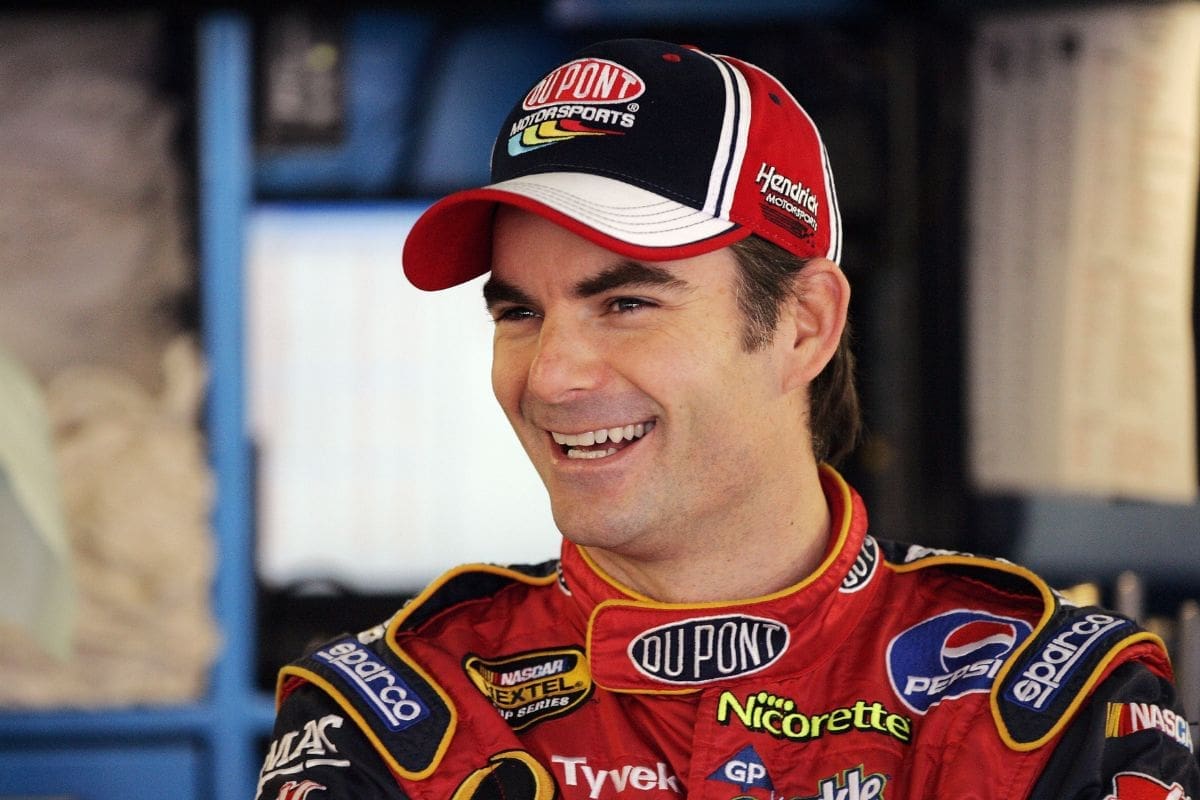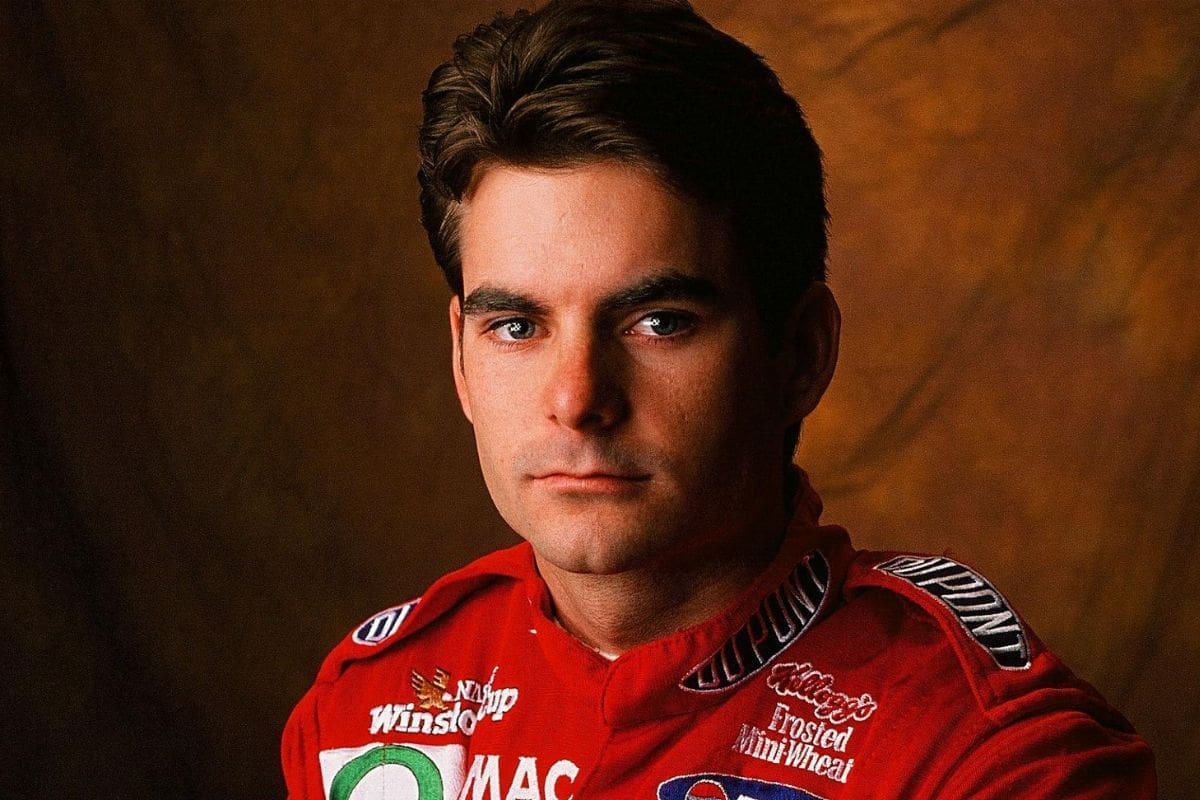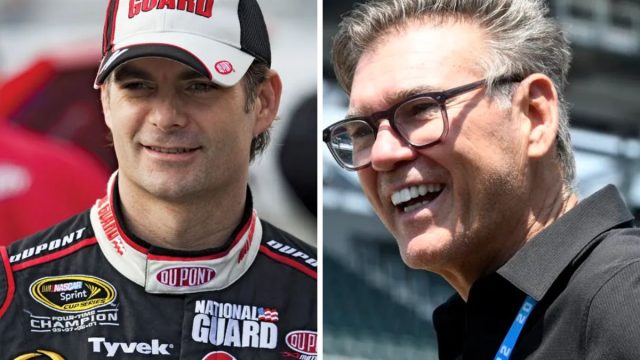Key Takeaways
- The clash occurred during the 1998 Las Vegas race, highlighting a rare disagreement between Gordon and Evernham.
- Tensions arose over strategic decisions, leading to a heated exchange between the pair.
- This incident underscored the high-pressure environment of NASCAR racing and its challenges.
- Despite the disagreement, it showcased Gordon and Evernham’s resilience and ability to navigate through difficulties.
- Their relationship, marked by both tension and humor, remained strong, illustrating their dedication to success.
The Dominance of Jeff Gordon in the Late 1990s
Jeff Gordon emerged as a colossus on the NASCAR circuit in the late 1990s, redefining success with an impressive tally of 47 Premier Series victories between 1995 and 1999, a period that witnessed his unparalleled dominance in the sport. While fierce rivalries and legendary figures marked this era, Gordon’s brilliance shone distinctly. His ascent was not merely a reflection of his driving prowess but also highlighted the synergy within the Hendrick Motorsports team, spearheaded by the innovative strategies of crew chief Ray Evernham. Gordon’s dominance was characterized by a blend of raw talent, cutting-edge technology, and a relentless pursuit of victory. Each race appeared to be a masterclass in precision driving, with Gordon often outmaneuvering seasoned veterans and leaving competitors in his wake. This period of dominance also marked a significant shift in NASCAR’s landscape, introducing a new era where technology, strategy, and driver fitness played increasingly important roles. The impact of Gordon’s achievements during these formative years extended beyond the track. He became a cultural icon, attracting new fans to the sport and elevating NASCAR to unprecedented levels of national attention and commercial success. His rivalry with Dale Earnhardt Sr., dubbed ‘The Intimidator,’ added an engaging narrative, contrasting Gordon’s polished image with Earnhardt’s rugged persona. In essence, Jeff Gordon’s late 1990s supremacy transformed NASCAR, setting new standards of excellence and professionalism. His legacy, encapsulated in those 47 victories, continues to inspire drivers and teams, underscoring the enduring influence of his remarkable stint at the pinnacle of motorsport. 
Gordon’s Remarkable Season in 1998
“We had a little blowout on the radio at Vegas. It was kind of funny because we couldn’t stay angry. Like after the race, he’d come in and he’d look at me like a kid, like my little brother. And I would laugh, or he would laugh. So we would just start laughing.” – (Ray Evernham)
The 1998 season for Jeff Gordon was more than just about winning races; it was about setting a benchmark in the sport, about a driver and his crew chief operating at their zenith. Despite occasional internal conflicts, their collective focus on the ultimate prize never wavered, illustrating that even in moments of disagreement, their partnership thrived on mutual respect and a shared vision of excellence.
The Incident at the 1998 Las Vegas Race
A moment of contention that still resonates with Ray Evernham unfolded at the 1998 Las Vegas race, marking a rare blemish on the otherwise illustrious partnership he shared with Jeff Gordon. The Hendrick Motorsports’ #24 team, a dominant force in late 1990s NASCAR, encountered an unusual challenge that day, which tested the mettle of both driver and crew chief in ways that few events had before.
Even @RayEvernham and @JeffGordonWeb had some tense moments on the radio.@KevinHarvick | #NASCAR pic.twitter.com/0DbcVXIirZ
— HarvickHappyHour (@HarvickHappyPod) April 4, 2024
The incident, deeply etched in the annals of NASCAR drama, stemmed from a strategic disagreement between Gordon and Evernham, a duo renowned for their almost telepathic understanding on the track. Up to that point, their collaboration had been characterized by a seamless blend of Gordon’s raw driving talent and Evernham’s innovative strategies. However, the Las Vegas race exposed a rare crack in their armor, as a pivotal decision led to a heated exchange, highlighting the intense pressure under which both operated. This moment of discord was not just a blip in an otherwise successful partnership but a reflection of the high stakes involved in NASCAR racing. It showcased the fact that even the most harmonious teams could face moments of disagreement, especially when the pursuit of victory pushed them to their limits. The incident at the Las Vegas race served as a poignant reminder of the complexities of communication and decision-making in the heat of competition, adding a layer of depth to the legacy of Gordon and Evernham’s collaboration. Their ability to navigate through this challenge, while maintaining their focus on the overarching goal of winning, emphasized the resilience and adaptability that defined their storied partnership. 
Fallout Between Gordon and Evernham
The relationship between Jeff Gordon and Ray Evernham, once defined by seamless victories and mutual respect, began to show signs of strain following a series of high-pressure races in 1998, culminating in a memorable confrontation during the Las Vegas event. This period in their professional journey was marked by a palpable tension that reflected the intense competitive environment of NASCAR racing. Jeff Gordon, driving the iconic Chevy Monte Carlo, found himself increasingly at odds with the aggressive tactics of Ford Taurus drivers. Amidst this high-stakes atmosphere, Gordon’s frustration reached a boiling point. His in-race communication with Evernham, filled with urgent complaints about the car’s performance and the challenges posed by rivals, highlighted the mounting pressure each faced. Evernham’s response, a mix of practicality and stern guidance, “Well then, shut up and drive it because I can’t run alongside it and fix it,” signified a critical moment in their collaboration. This exchange was not just about in-the-moment strategy but highlighted a deeper rift that had developed under the weight of expectation and the relentless pursuit of success.
“And he’s screaming this, that, oh my god. I said, ‘Okay, then come in and we’ll pit’. ‘We can’t pit, you know if we pit, we’ll go a lap down.’ I said, ‘Well then, shut up and drive it because I can’t run alongside it and fix it.’ And then he didn’t say another word to me.” – (Ray Evernham)
The fallout between Gordon and Evernham during this period is emblematic of the high-octane world of NASCAR, where the line between success and friction can be as thin as the finish line. Their confrontation, while a rare glimpse into the stresses of their partnership, also demonstrated their dedication to their sport. Despite the challenges, their ability to navigate these tensions showcased the complexity and depth of their professional relationship, set against the backdrop of NASCAR’s unforgiving racetracks.
Reflection on Their Relationship and Humorous Anecdotes
Reflecting on their storied partnership, Jeff Gordon and Ray Evernham’s relationship, punctuated by both tension and triumph, also harbored moments of unexpected humor and camaraderie, epitomized by their memorable first encounter. The foundation of their bond, built on shared ambition and a dash of serendipity, was laced with the kind of anecdotes that enrich the tapestry of NASCAR history. Their initial meeting, now a legendary tale within the racing community, serves as a perfect illustration of the unique blend of professionalism and personal connection that defined their dynamic.
| Aspect | Detail |
|---|---|
| First Encounter | Jeff Gordon, not yet a full-time Cup driver, was chauffeured by his mother due to his inability to rent a car, highlighting an endearing start to a monumental partnership. |
| Shared Quirk | Both individuals, despite their differing roles within the sport, carried briefcases to their initial meeting—a subtle nod to their shared seriousness and commitment to success in NASCAR. |
| Iconic Circumstances | This meeting under such unique conditions laid the groundwork for a relationship that would go on to shape the future of racing, blending youthful ambition with seasoned expertise. |
This intersection of personal quirks and professional dedication created a fertile ground for both tension and triumph, but it was their ability to navigate these with a sense of humor and mutual respect that truly set them apart. Their journey, from an amusingly unconventional first meeting to becoming icons of NASCAR, underlines the unpredictable path of success and the enduring power of a strong partnership. 
News in Brief
The rare discord between Jeff Gordon and Ray Evernham during the 1998 Las Vegas race not only highlighted the intense pressures inherent in NASCAR competitions but also emphasized the resilience and dedication within professional partnerships. Despite the challenges, their ability to navigate through conflicts and maintain successful collaboration serves as a confirmation of the strength of their relationship. This incident, while highlighting the drama of the sport, ultimately strengthened their bond, illustrating the importance of enduring partnerships in achieving excellence.
Our Reader’s Queries
Q: How many races did Jeff Gordon win with Ray Evernham?
A: Gordon and Evernham secured 47 Cup wins and 3 championships (1995, 1997, and 1998), establishing dominance in NASCAR Cup competition. Evernham’s prowess as a crew chief earned him induction into the NASCAR Hall of Fame’s Class of 2018.
Q: Why was Jeff Gordon’s car rainbow?
A: Bass, who passed away in February, revealed to Autoweek, “I was thinking about the (DuPont) oval on the hood and how the lines above it would naturally form a rainbow. I knew the moment I drew it, that this was the one.” Out of 43 submissions for Gordon’s car, DuPont selected Bass’s rainbow design.
Q: Is Ray Evernham in the Hall of Fame?
A:Inducted into the NASCAR Hall of Fame in 2018, Evernham has been a pivotal figure in the sport since 1990, witnessing and contributing to significant changes in NASCAR’s landscape over the years. Also Read: Connor Zilisch Targets Jeff Gordon’s Throne: Cup Series Aspirations” href=”https://slicksandsticks.com/2024/03/29/connor-zilisch-targets-jeff-gordons-throne-cup-series-aspirations/” rel=”bookmark”>Connor Zilisch Targets Jeff Gordon’s Throne: Cup Series Aspirations
